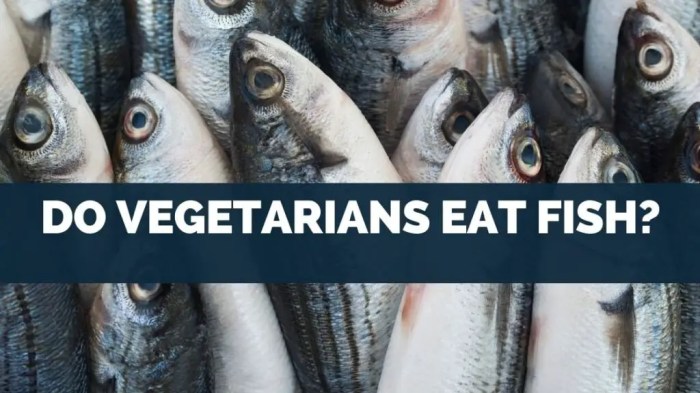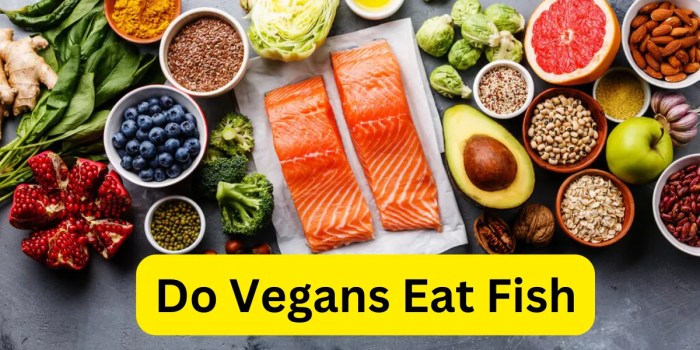As do vegans eat fish takes center stage, this opening passage beckons readers into a world crafted with good knowledge, ensuring a reading experience that is both absorbing and distinctly original.
The content of the second paragraph that provides descriptive and clear information about the topic
Veganism Definition

Veganism is a lifestyle that excludes all forms of animal exploitation and cruelty, extending beyond food choices to encompass all aspects of life. Vegans abstain from consuming meat, poultry, fish, eggs, dairy, honey, and any other animal-derived products. They also avoid using products tested on animals, such as cosmetics, clothing, and household items.
The core principles of veganism are compassion for animals, environmental sustainability, and personal health. Vegans believe that all animals deserve to live free from suffering and exploitation and that their bodily autonomy should be respected. They also recognize the environmental impact of animal agriculture, which contributes to deforestation, water pollution, and climate change.
Additionally, many vegans choose this lifestyle for its potential health benefits, as plant-based diets have been linked to reduced risks of heart disease, certain types of cancer, and obesity.
Ethical Motivations, Do vegans eat fish
The ethical motivations behind veganism stem from the belief that animals are sentient beings capable of experiencing pain, suffering, and joy. Vegans reject the idea that humans have the right to exploit animals for food, clothing, or any other purpose.
They argue that animals are not commodities or resources but rather individuals with inherent value and the right to live free from harm.
Environmental Motivations
The environmental motivations behind veganism are rooted in the recognition of the significant impact that animal agriculture has on the planet. The raising of animals for food requires vast amounts of land, water, and energy, and it contributes to deforestation, water pollution, and greenhouse gas emissions.
By choosing a plant-based diet, vegans can reduce their environmental footprint and help protect the planet.
Dietary Restrictions
Veganism imposes strict dietary restrictions that exclude all animal-derived products. This includes meat, poultry, fish, eggs, dairy, and honey.
Vegans abstain from animal products for various reasons, primarily ethical concerns about animal welfare and environmental sustainability.
Excluded Foods
- Meat: Beef, pork, lamb, veal, etc.
- Poultry: Chicken, turkey, duck, goose, etc.
- Fish: Salmon, tuna, cod, tilapia, etc.
- Eggs
- Dairy: Milk, cheese, yogurt, butter, etc.
- Honey
Reasons for Exclusion
Vegans believe that animals should not be exploited or harmed for food. They argue that factory farming practices often involve inhumane treatment of animals.
Embracing a vegan lifestyle entails abstaining from all animal-derived products, including meat, dairy, eggs, and honey. While this may seem daunting, following a vegan diet can be surprisingly simple. By incorporating a variety of plant-based foods into your meals, you can meet all your nutritional needs while enjoying delicious and satisfying dishes.
Additionally, veganism promotes environmental sustainability. Animal agriculture contributes significantly to greenhouse gas emissions, deforestation, and water pollution.
Fish Consumption
In the traditional sense, fish have been a significant food source for many cultures around the world. They provide essential nutrients like protein, omega-3 fatty acids, and vitamins.
However, the inclusion of fish in a vegan diet is a subject of debate. Some individuals believe that fish, being animals, should not be consumed as part of a vegan lifestyle.
Defining Veganism
Veganism is a philosophy and lifestyle that seeks to exclude all forms of animal exploitation and cruelty, including the consumption of meat, dairy, eggs, and other animal-derived products.
Fish as Non-Vegan
Those who consider fish to be non-vegan argue that fish are sentient beings capable of experiencing pain and suffering. They believe that consuming fish goes against the fundamental principles of veganism, which prioritize the well-being of all animals.
Embarking on a vegan lifestyle can be a transformative journey. To ensure a successful transition, it’s crucial to educate yourself on how to follow a vegan diet. This involves understanding the nutritional needs of your body and learning how to source essential nutrients from plant-based foods.
Vegan Perspectives
The consumption of fish is a contentious issue within the vegan community, with differing perspectives on whether it aligns with vegan principles. Some vegans believe that fish are sentient beings capable of experiencing pain and suffering, and therefore, consuming them goes against the fundamental tenets of veganism, which emphasizes the avoidance of harm to all animals.
Others argue that fish are not as cognitively developed as mammals and that their consumption does not constitute a significant ethical concern. They may view veganism as primarily focused on reducing harm to sentient beings, and since fish are considered less sentient, their consumption may not be seen as a violation of vegan principles.
Interpretations of Veganism
- Strict Veganism:Adherents believe that veganism extends to all animals, including fish, and that their consumption is unethical.
- Pescetarian Veganism:A less common interpretation that allows for the consumption of fish while excluding other animal products from the diet.
- Flexitarian Veganism:Allows for occasional consumption of fish or other animal products but emphasizes a predominantly plant-based diet.
Health Considerations

Vegan diets have been associated with various health benefits, including reduced risk of chronic diseases such as heart disease, type 2 diabetes, and some types of cancer. This is largely attributed to the high intake of fruits, vegetables, whole grains, and legumes, which are rich in fiber, antioxidants, and phytonutrients.
However, a vegan diet may also pose certain nutritional risks, particularly if not planned carefully. Vegans need to ensure adequate intake of essential nutrients such as vitamin B12, iron, calcium, and omega-3 fatty acids, which are typically found in animal products.
Nutritional Value of Fish
Fish is a rich source of protein, omega-3 fatty acids, vitamin D, and other essential nutrients. Omega-3 fatty acids are crucial for brain and heart health, and they cannot be synthesized by the body. Vegans who do not consume fish or other sources of omega-3s may be at risk of deficiency.
Environmental Impact

Fish consumption has significant environmental implications, primarily due to overfishing and aquaculture practices.
Overfishing depletes fish populations, disrupts marine ecosystems, and threatens the livelihoods of those dependent on fishing. Aquaculture, while providing an alternative to wild-caught fish, often involves intensive farming methods that can harm the environment through pollution, habitat destruction, and the use of antibiotics.
Comparison to Veganism
In comparison, veganism has a lower environmental impact. By abstaining from animal products, vegans reduce the demand for livestock, which is a major contributor to greenhouse gas emissions, deforestation, and water pollution.
- Greenhouse Gas Emissions:Livestock production is responsible for a significant portion of global greenhouse gas emissions, particularly methane and nitrous oxide. By eliminating animal products, vegans contribute to reducing these emissions.
- Deforestation:Large areas of land are cleared for grazing and feed production for livestock. Veganism reduces the demand for these products, thereby helping to protect forests and biodiversity.
- Water Pollution:Livestock waste and runoff from feed production can contaminate water sources. Veganism reduces the need for these practices, contributing to cleaner waterways.
Final Conclusion
The content of the concluding paragraph that provides a summary and last thoughts in an engaging manner
Expert Answers: Do Vegans Eat Fish
Is fish considered vegan?
No, fish is not considered vegan as it is an animal product.
Can vegans eat seafood?
No, vegans do not eat seafood as it is derived from animals.
What are the main reasons why vegans do not eat fish?
Vegans do not eat fish due to ethical concerns about animal welfare and environmental impact.